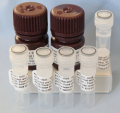1

Anti-AGO1 | Argonaute 1, DyLight® 650 conjugated (40 µg)
- Product Info
-
Immunogen: KLH-conjugated, N-terminal peptide of Arabidopsis thaliana AGO1 O04379, At1g48410 Host: Rabbit Clonality: Polyclonal Purity: Immunogen affinity purified serum, in PBS pH 7.4, conjugated to DyLight® 650.
Format: Liquid in PBS pH 7.4. Quantity: 40 µg Storage: Store at 4°C for 12-18 months, A preservative may be added for long time storage up to 2 years. Spin briefly the tube before use. Tested applications: Immunofluorescence (IF), Western blot (WB) Recommended dilution: To be determined by end user. Expected | apparent MW: 116.4 | 130 kDa - Reactivity
-
Confirmed reactivity: Arabidopsis thaliana, Nicotiana benthamiana Predicted reactivity: Brassica pekinensis, Capsella rubella, Glycine max, Malus domestica, Pisum sativum, Ricinus communis, Solanum tuberosum, Zea mays, Vitis vinifera
Species of your interest not listed? Contact usNot reactive in: Chlamydomonas reinhardtii, Oryza sativa, Phaseolus vulgaris, Triticum aestivum, Zea mays - Additional Information
-
Additional information: Antibody binds microRNA and tasiRNAs, preference for 21nt miRNAs with 5'U, TCA acetone total protein precipitation method.
DyLight® 650 has Amax = 652 nm, Emax = 672 nm. DyLight® is a registered trademark of Thermofisher Inc., and its subsidiaries.Additional information (application): AGO expression may be tissue specific and using floral tissue is recommended where most of the AGOs are expressed the highest. Use of proteasome inhibitors as MG132 can help to stabilize AGO proteins during extraction procedure. The AGO1 antibody is extremely specific to AGO1 and does not cross-react with other antibodies. The evidence is 1) the peptide to which it was raised is at the very N-terminus of the protein and is not present in other AGOs 2) aAGO1 does not cross react with the AGOs which are overexpressed (AGO2, AGO3, AGO4, AGO5, AGO6, AGO9) using a western blot. - Background
-
Background: AGO1 belongs to a group of argonaute proteins which are catalytic component of the RNA-incudes silencing complex (RISC), This protein complex is responsible for the gene silencing (RNAi),This antibody is directly conjugated to Horseradish Peroxidase (HRP). - Protocols
-
Agrisera Western Blot protocol and video tutorials
Protocols to work with plant and algal protein extracts
Agrisera Educational Posters Collection
- Reviews:
-
This product doesn't have any reviews.
Accessories

AS07 260 | Clonality: Polyclonal | Host: Rabbit | Reactivity: [global antibody] for di- and monocots, conifers, ferns, mosses, green algae | Cellular [compartment marker] for plasma membrane
Benefits of using this antibody

AS07 213 | Clonality: Polyclonal | Host: Rabbit | Reactivity: Higher plants including A.comosus, A.thaliana, C.sativus, C. australis R.Br, C.reinhardtii, F. margarita Swingle, H.vulgare, L.esculentum, L.longiflorum, Malus x domestica Borkh. c.v. Fuji, M. truncatula, M.crystallinum, N.tabacum, N.caerulescens, O.sativa, P.hybrida cv. Mitchell, Populus sp., P.vittata, Thellungiella sp., T. aestivum, Z.mays, V. vinifera | Cellular [compartment marker] of tonoplast membrane

This set contains:
- 4 Anti-AGO antibodies of your choice, chosen from a drop down menu below
- Matching secondary antibody, HRP conjugated, min. 1: 25 000, 1h/RT (AS09 602 - trial)

